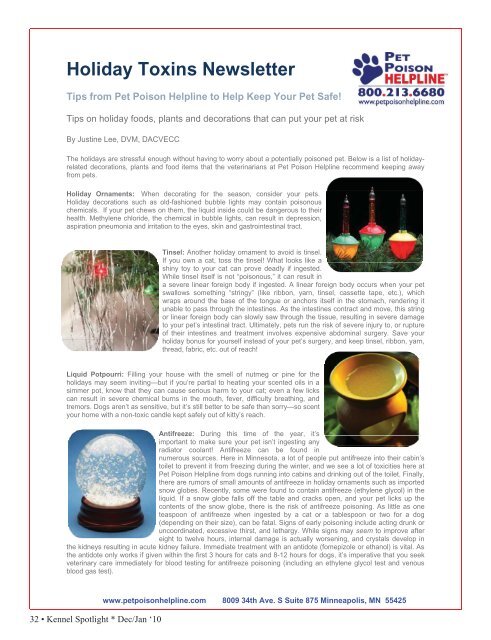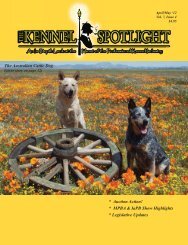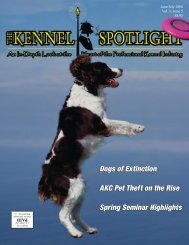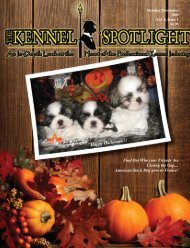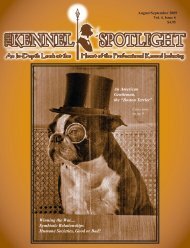Monark Puppies - Kennel Spotlight
Monark Puppies - Kennel Spotlight
Monark Puppies - Kennel Spotlight
Create successful ePaper yourself
Turn your PDF publications into a flip-book with our unique Google optimized e-Paper software.
Holiday Toxins Newsletter<br />
Tips from Pet Poison Helpline to Help Keep Your Pet Safe!<br />
Tips on holiday foods, plants and decorations that can put your pet at risk<br />
By Justine Lee, DVM, DACVECC<br />
The holidays are stressful enough without having to worry about a potentially poisoned pet. Below is a list of holidayrelated<br />
decorations, plants and food items that the veterinarians at Pet Poison Helpline recommend keeping away<br />
from pets.<br />
Holiday Ornaments: When decorating for the season, consider your pets.<br />
Holiday decorations such as old-fashioned bubble lights may contain poisonous<br />
chemicals. If your pet chews on them, the liquid inside could be dangerous to their<br />
health. Methylene chloride, the chemical in bubble lights, can result in depression,<br />
aspiration pneumonia and irritation to the eyes, skin and gastrointestinal tract.<br />
Tinsel: Another holiday ornament to avoid is tinsel.<br />
If you own a cat, toss the tinsel! What looks like a<br />
shiny toy to your cat can prove deadly if ingested.<br />
While tinsel itself is not “poisonous,” it can result in<br />
a severe linear foreign body if ingested. A linear foreign body occurs when your pet<br />
swallows something “stringy” (like ribbon, yarn, tinsel, cassette tape, etc.), which<br />
wraps around the base of the tongue or anchors itself in the stomach, rendering it<br />
unable to pass through the intestines. As the intestines contract and move, this string<br />
or linear foreign body can slowly saw through the tissue, resulting in severe damage<br />
to your pet’s intestinal tract. Ultimately, pets run the risk of severe injury to, or rupture<br />
of their intestines and treatment involves expensive abdominal surgery. Save your<br />
holiday bonus for yourself instead of your pet’s surgery,<br />
and keep tinsel, ribbon, yarn,<br />
thread, fabric, etc. out of reach!<br />
Liquid Potpourri: Filling your house with the smell of nutmeg or pine for the<br />
holidays may seem inviting—but if you’re partial to heating your scented oils in a<br />
simmer pot, know that they can cause serious harm to your cat; even a few licks<br />
can result in severe chemical burns in the mouth, fever, difficulty breathing, and<br />
tremors. Dogs aren’t as sensitive, but it’s still better to be safe than sorry—so scent<br />
your home with a non-toxic candle kept safely out of kitty’s reach.<br />
Antifreeze: During this time of the year, it’s<br />
important to make sure your pet isn’t ingesting any<br />
radiator coolant! Antifreeze can be found in<br />
numerous sources. Here in Minnesota, a lot of people put antifreeze into their cabin’s<br />
toilet to prevent it from freezing during the winter, and we see a lot of toxicities here at<br />
Pet Poison Helpline from dogs running into cabins and drinking out of the toilet. Finally,<br />
there are rumors of small amounts of antifreeze in holiday ornaments such as imported<br />
snow globes. Recently, some were found to contain antifreeze (ethylene glycol) in the<br />
liquid. If a snow globe falls off the table and cracks open, and your pet licks up the<br />
contents of the snow globe, there is the risk of antifreeze poisoning. As little as one<br />
teaspoon of antifreeze when ingested by a cat or a tablespoon or two for a dog<br />
(depending on their size), can be fatal. Signs of early poisoning include acting drunk or<br />
uncoordinated, excessive thirst, and lethargy. While signs may seem to improve after<br />
eight to twelve hours, internal damage is actually worsening, and crystals develop in<br />
the kidneys resulting in acute kidney failure. Immediate treatment with an antidote (fomepizole or ethanol) is vital. As<br />
the antidote only works if given within the first 3 hours for cats and 8-12 hours for dogs, it’s imperative that you seek<br />
veterinary care immediately for blood testing for antifreeze poisoning (including an ethylene glycol test and venous<br />
blood gas test).<br />
www.petpoisonhelpline.com 8009 34th Ave. S Suite 875 Minneapolis, MN 55425<br />
<br />
32 • <strong>Kennel</strong> <strong>Spotlight</strong> * Dec/Jan ‘10


